IBGE participates in presentation of the Voluntary National Review on the progress of the 2030 Agenda
July 24, 2024 09h00 AM | Last Updated: July 24, 2024 11h29 PM
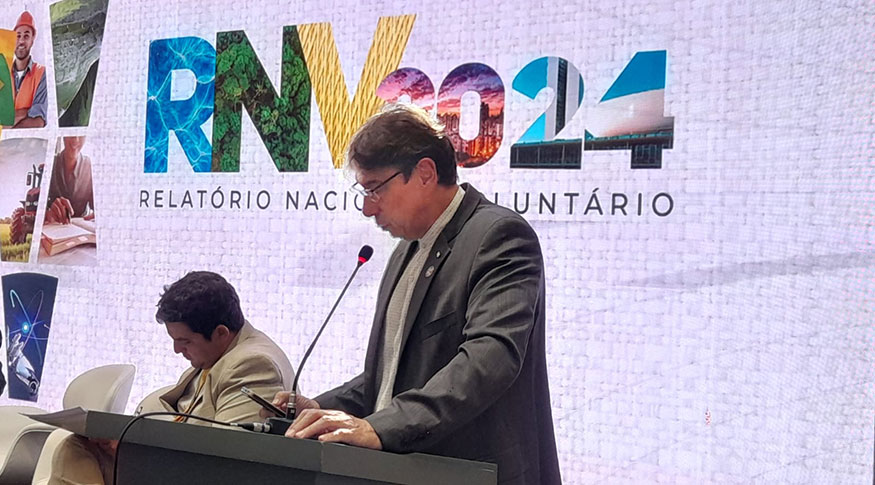
The Brazilian Institute of Geography and Statistics (IBGE) participated, on Tuesday, 23, in the presentation of the Voluntary National Review (VNR) at Praça Mauá, downtown Rio de Janeiro (RJ). This report reviews the progress of targets for the 2030 Agenda in Brazil, having the IBGE as the producer of indicators being analyzed. The 2030 Agenda is a global plan of action gathering 17 sustainable development goals and 169 targets, created to eradicate poverty and promote decent life for all, with no without prejudice to future generations; it was adopted in 2015 by the 193 UN Member States.
Márcio Macêdo, Minister of the General Secretariat of the Presidency, spoke about the joint efforts of the IBGE and other institutions to produce the report. “I than institutes such as the IBGE, Ipea, Fiocruz and Itaipu Binacional for shaping the technical format of the VNR. We have managed to monitor bases and properly measure the work conducted by the Federal Government and, therefore, present to the world what we have accomplished in our country.”
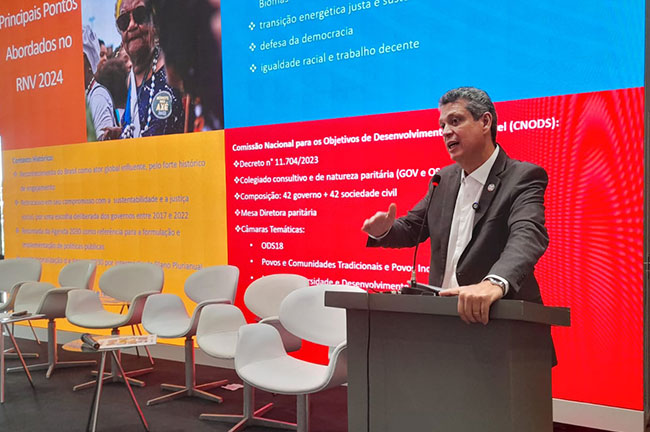
In his speech, Macêdo listed the main topics dealt with in the 2024 VNR and spoke about the methodology for construction of the report, the evolution of targets in Brazil and prospects for the future. “Our aim is strengthening governance of the 2023 Agenda in the country, as well as the adequacy of targets and indicators to the Brazilian society, improvement of SDG monitoring and its territorialization.”
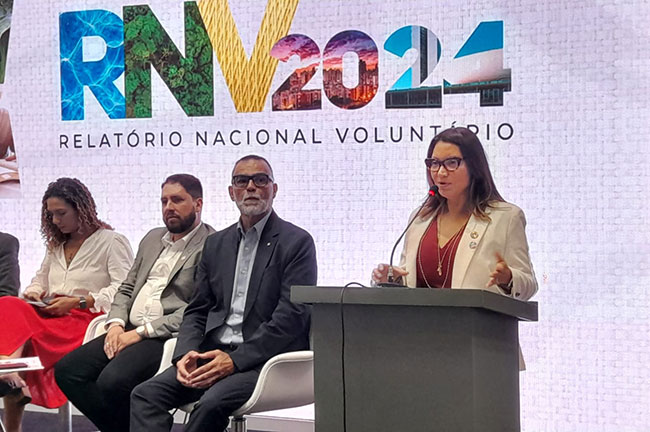
The first lady of Brazil, Janja Lula da Silva, celebrated the fact that the “National Commission for the Sustainable Development Goals (CNODS) has strived to get Brazil back on the track so that we can meet the targets we committed to, together with the Federal Government, local governments and civil society organizations, which resumed the monitoring of goals by means of Institutes such as Ipea, IBGE, Itaipu Binacional and Fiocruz. Today we celebrate the return of the National Voluntary Review.”
The president of the Brazilian Institute of Geography and Statistics (IBGE), Marcio Pochmann, stressed that the Institute “is a technical institution whose mission is to portray the Brazilian reality by means of the surveys it carries out. The Institute holds the biggest database in the country and remains active thanks to the efforts of almost 11 thousand civil servants working in 567 branches in Brazil. The IBGE has tried to assist in the production, dissemination and discussion of SDG targets and indicators”. The focus of the Institute, added Pochmann, must be “the production of indicators to monitor and evaluate the National Plan, in order to fill in the blanks of targets not yet measured, that is, those not covered by the global indicators.”
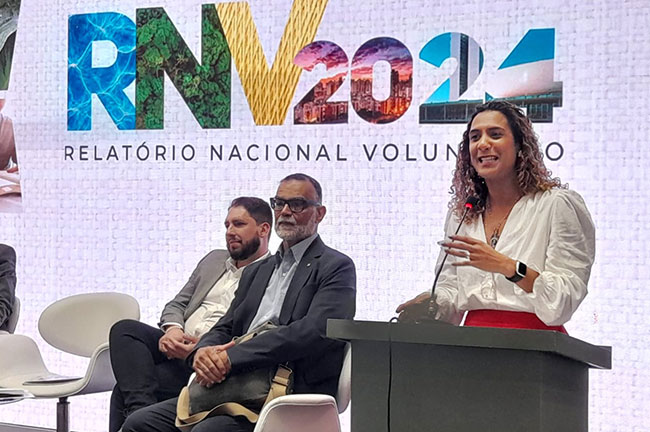
Anielle Franco, Minister of Racial Equality, explained that sustainable development refers to economic development and environmental protection, but also to the promotion of decent life for all. The release of this national Voluntary Review of the SDG are important steps towards the consolidation of this objective, and we will make our greatest efforts to fight social inequality”.
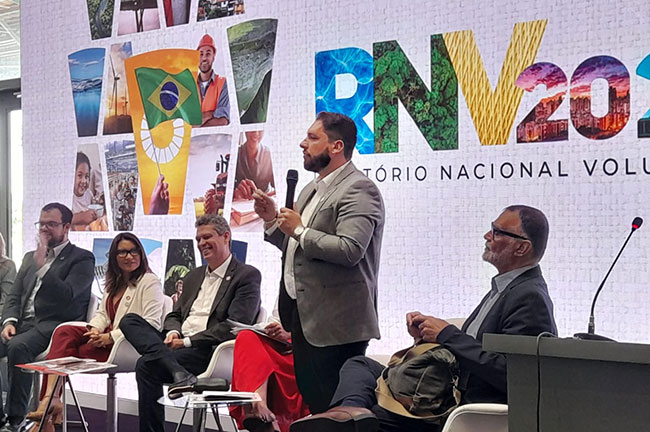
Márcio Tavares is acting Minister of Culture and he stressed that this report is an important landmark, as it shows Brazil is committed to the 2023 Agenda and sustainable development. It presents significant results in many of these objectives and each one shows how investment in culture is important for all these SDG. Communities with Investments in health show improvements in health, public security and education indicators.”
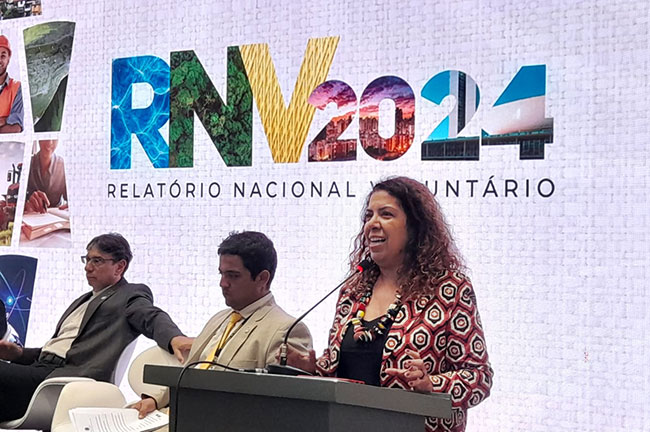
Luciana Servo, president of the Institute for Applied Economic Research (Ipea), stated that “without the technical commitment of servants, this report would not have the same quality and we should also mention the great support from the National Commission of the SDG. Ipea and the IBGE have been monitoring these data since the Millennium Development Goals (ODM), and the IBGE has a portal for indicators that are fundamental in this study. There is an institutional commitment of these agencies to provide civil society with data and, besides technical quality, leadership also counts.”
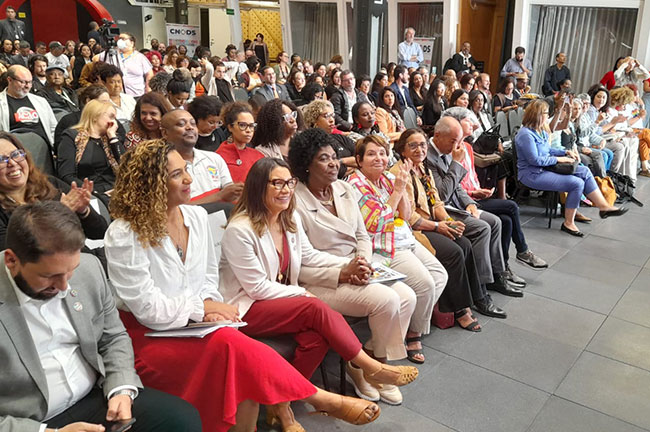
The event was also attended by federal representative Benedita da Silva, the president of Fiocruz, Mario Moreira, the assistant to the director general of Itaipu Nacional, Silvana Vitorassi, the municipal secretary of the Municipal Government of Rio de Janeiro, Lucas Padilha, the ex-president of Oswaldo Cruz Foundation, Paulo Gadelha, a representative from the UN Sustainable Development Program, Maristela Baioni, the chief of office of Itaipu Binacional, among other authorities.
The Voluntary National Review
The Voluntary National Review is a form of monitoring the implementation of Sustainable Development Goals. The review can be submitted to the UN by countries committed with the 2023 Agenda. The elaboration of the VNR was coordinated by the national Commission for the Sustainable Development Goals - CNODS, linked to the Executive Secretariat of the General Secretariat for the Presidency of the Republic, with the participation of a number of institutions such as IPEA, IBGE, Fiocruz, Itaipu Binacional, Ministry of Planning and Budget and the Ministry of Foreign Relations.
Mais about the SDG
The Sustainable Development Goals (SDG) are a global agenda adopted during the UN World Summit on Sustainable Development in September 2015, formed by 17 goals and 169 targets to be met by 2030. The agenda provides for global actions in eradication of poverty, food security, agriculture, health, education, gender equality, reduction of inequalities, energy, water and sewage, sustainable patters and production and consumption, change of climate, sustainable cities, protection and sustainable use of the oceans and land ecosystems, inclusive economic growth, infrastructure, industrialization, among others.




















